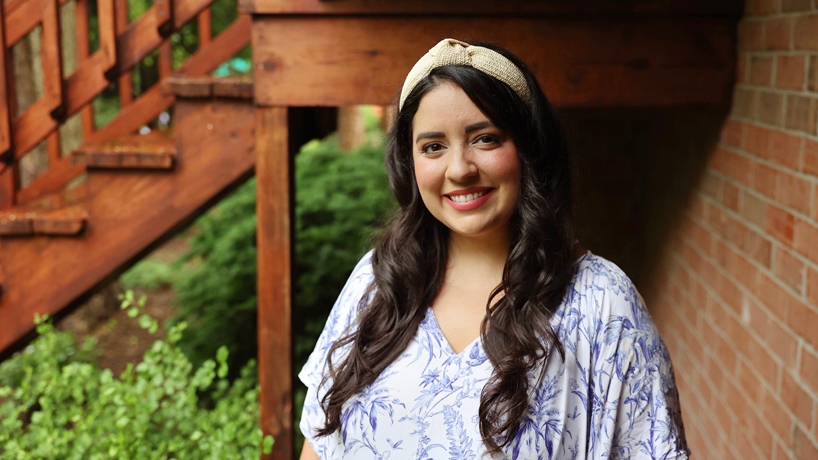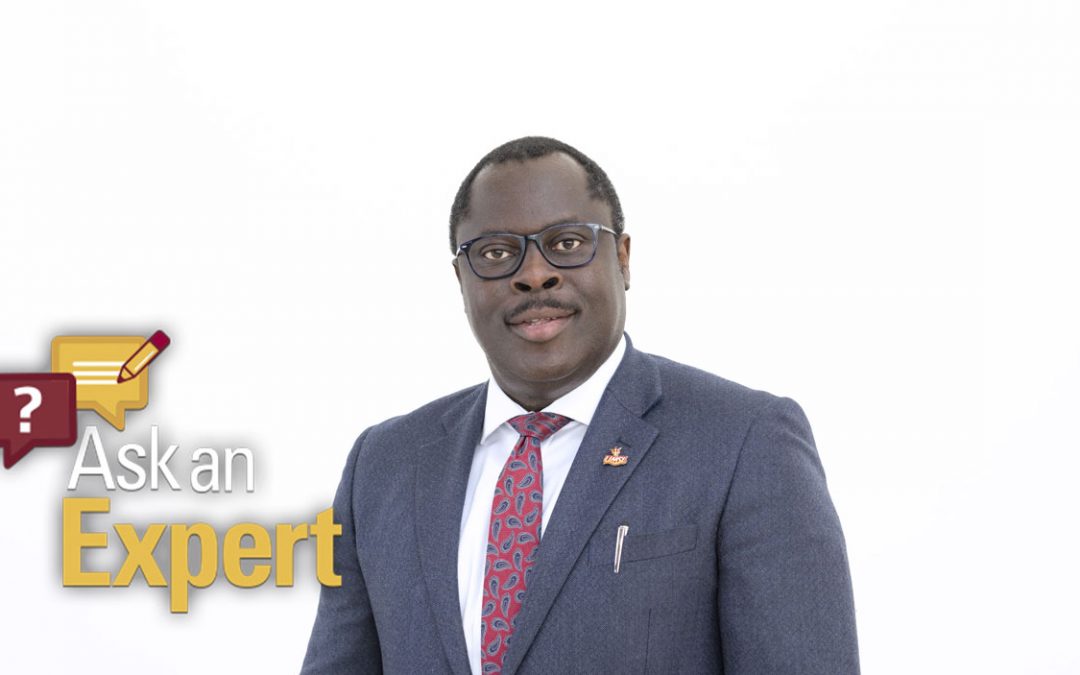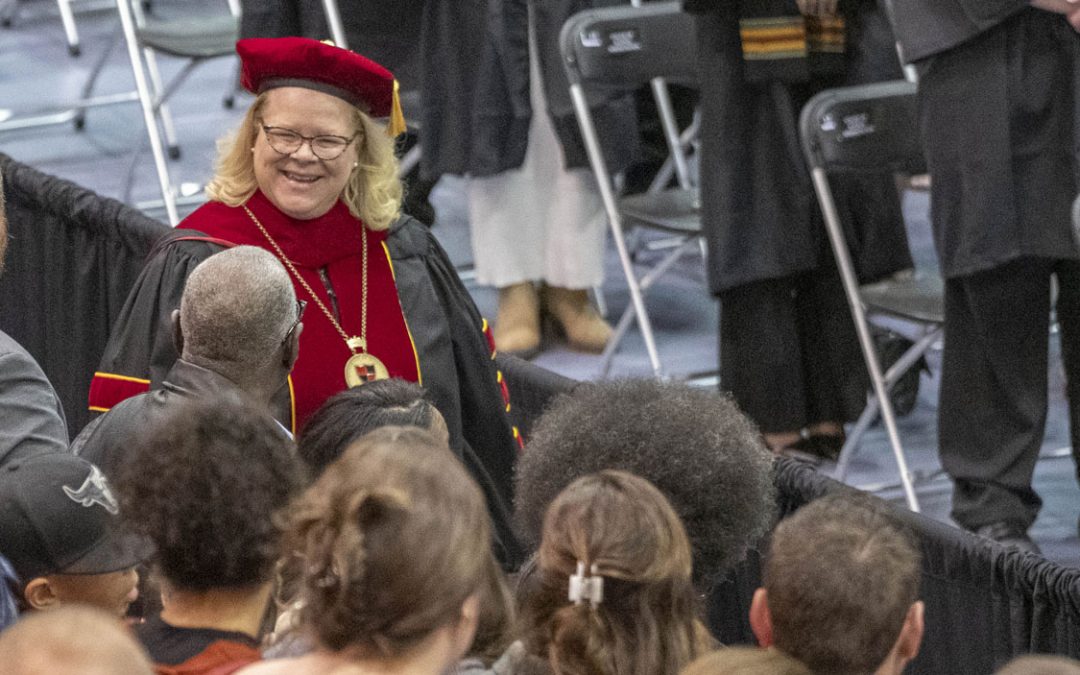
Monica Phelps-Pineda won the National Board of Certified Counselors Minority Fellowship Award, which included a $20,000 prize. The award will help Phelps-Pineda with her goal of securing a faculty position in a CACREP-accredited counseling program, where she intends to apply a “very necessary social justice lens” to counseling, education, dialogue and practice. It will also help her as she continues her doctoral research on multicultural counseling supervision. (Photo Courtesy of Brittany Ruess)
While working her way through school as a substitute ESL teacher, Monica Phelps-Pineda heard the same stories over and over again from her students.
They couldn’t dedicate necessary time to homework because they worked to help support their families and lacked access to basic resources that were crucial to their learning. Phelps-Pineda said they also “faced various other social determinants of health disparities that were disproportionately affecting their community, representing the academic field’s narrative shift from ‘achievement gap’ to ‘opportunity gap.’”
At the time, Phelps-Pineda was pursuing a bachelor’s degree in theater at Berry College, but those conversations changed the trajectory of her life and academic career. Compelled by a deep interest in better serving those students and her faith, she changed her major to psychology.
“I wanted to further understand the spectrum of systemic barriers faced by individuals who hold minoritized racial/ethnic identities as well as culturally responsive services and resources that are available to effectively meet their specific needs,” Phelps-Pineda said. “One of my first psychology classes touched on this, which sparked my intrigue. I wanted to continue pursuing spaces that valued discussion and action towards equity, advocacy and culturally informed care.”
Since then, Phelps-Pineda has earned a bachelor’s degree in psychology from Berry College, a master’s degree in clinical mental health counseling from the University of North Georgia and joined the counseling education PhD program in the College of Education at the University of Missouri–St. Louis.
Most recently, she won the National Board for Certified Counselors Minority Fellowship Award, which provides financial support to graduate students who commit to serving minority communities through research or service.
The $20,000 award will help Phelps-Pineda with her goal of securing a faculty position in a CACREP-accredited counseling program, where she intends to apply a “very necessary social justice lens” to counseling, education, dialogue and practice. It will also help her as she continues her doctoral research on multicultural counseling supervision.
Phelps-Pineda initially missed the call informing her that she’d been selected, but following up with an NBCC representative, it became clear she had won the fellowship. Then joy, as well as shock, set in.
“I was pacing back and forth, back and forth, and they said that I was a recipient,” she said. “Of course, my eyes welled up with tears, and I choked up. I just felt really, really honored to be chosen.”
The NBCC fellowship speaks to the importance Phelps-Pineda has placed on service in her professional and personal lives.
“My faith is the most foundational element in my life and is the reason for developing a servant leadership mindset,” she said.
It led Phelps-Pineda to teach ESL as an undergraduate and graduate student, as well as teaching English in several foreign countries such as Costa Rica, China, Mexico and Spain. The teaching trips were opportunities to understand different cultures, especially family dynamics and interpersonal communication.
One experience while teaching elementary school in Huacas, Costa Rica, was particularly stirring.
“When I went to Costa Rica, there was a student there that didn’t want to attend class and quite often received disciplinary referrals,” Phelps-Pineda said. “He was disinterested in the lessons and would argue about the need to complete assignments, for example. It was clear that he didn’t want to be there. However, I intentionally started spending more time with him outside of the classroom. I would sit next to him and have conversations during lunch about his interests and life dreams. We would take a lap around the playground before class or after school to talk about how to navigate challenges he was facing or strategize next steps for achieving his goals.
“I really invested into that relationship, demonstrating interest in him beyond his academic performance and his entire demeanor changed. He started wanting to come to school, participate and learn. He would then run up to me before school with the biggest grin and waving his completed homework in hand, enthusiastically screaming, ‘Look at what I did!’”
Phelps-Pineda said it helped her recognize the importance of relationships and investing in students. She saw that it can be incredibly powerful to an impressionable young mind to have somebody care. The experience strengthened her resolve to further her education and pursue a career in the mental health field.
After completing her master’s degree, Phelps-Pineda moved to Missouri with her husband when he secured a place in a residency program in the state. She began researching counselor education PhD programs, and UMSL immediately stood out. The program’s diversity – of faculty members and their research interests – impressed her.
“After doing my interview, I thought, ‘Wow, that’s a great group of people, and I would love to learn from them,’” she said.
Since joining the program, she’s appreciated the support system it has provided and noted that mentors such as Assistant Professor Phillip Waalkes, Assistant Professor Mary Edwin and Assistant Professor Emily Brown have been instrumental in her success.
Her mentors have been especially helpful with Phelps-Pineda’s doctoral dissertation, “Multicultural Counseling Supervision: A 10-Year Qualitative Content Analysis.” The study will examine how the counseling field conceptualizes multiculturally competent counseling supervision and identify how intersectionality is understood, how it’s being implemented and what gaps exist.
Multiculturally competent counseling entails counseling supervisors being mindful of the ways in which they acknowledge the diversity and identities of themselves, their supervisees and the clients and also working to recognize how those aspects interact within the systems in which they live.
Phelps-Pineda chose to investigate the topic because of her own experiences as an undergraduate and graduate student.
“I started realizing more and more how important culturally responsive supervision was for my growth as a counselor and student supervisor for master’s students in practicum and field,” Phelps-Pineda said. “This growth involved deeply reflecting on how my needs were met and how my needs were unmet – and utilizing these experiences to facilitate building awareness among counselor educators of the diverse student experience and interrupt the perpetuation of privilege in counseling education, practice and supervision.”
“There’s a lot of opportunity for supervisors to continue growing and learning how to incorporate more multiculturally competent supervision practices. I know personally that this was an unfulfilled need of my own as a counselor-in-training.”
Phelps-Pineda expects to finish her dissertation and graduate by next summer, after which she’ll start looking for a counselor education faculty position. For now, she’s enjoying the fellowship and the opportunities it’s providing.
“Mentorship is incredibly important for anyone – especially for those that are entering spaces of persistent historical exclusion of your diverse identities,” Phelps-Pineda said. “I don’t know that I would have gotten to where I am had I not had people invest into me. I think that is what makes this opportunity with the NBCC foundation so significant and validating. In addition to the access I will have to networking, training and professional development through this fellowship, we’re also going to learn how to become better mentors ourselves. The way that we were filled, the way that we were poured into, we can learn how to best do that for others. I’m humbled to be presented with this opportunity.”














